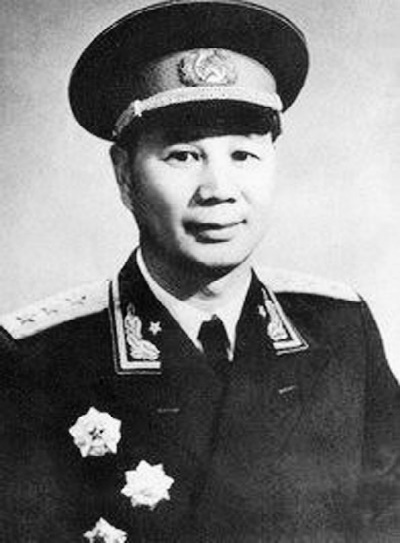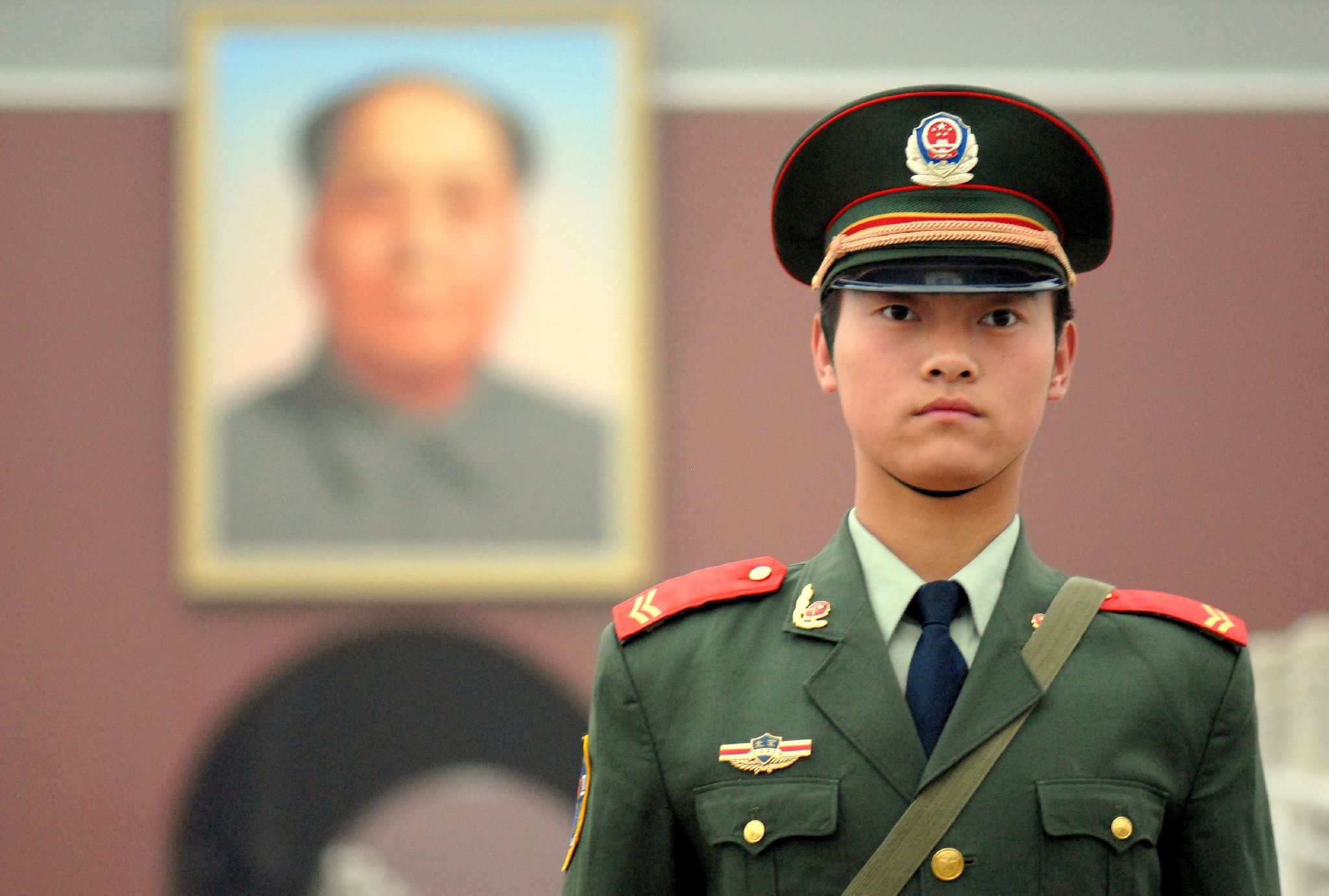|
Beijing Military Region
The Beijing Military Region was one of seven military regions for the Chinese People's Liberation Army. From the mid-1980s to 2017, it had administration of all military affairs within Beijing city, Tianjin city, Hebei province, Shanxi province, and Inner Mongolia Autonomous Region. The Region is mainly responsible for defending the People's Republic of China from Mongolia and Russia, and also protects the capital of China, and had the largest number of military personnel of any of the seven regions active from 1985 to 2017. The Region has now been disbanded and superseded by the Central Theater Command and Northern Theater Command. Both the 63rd and 65th Corps/Group Armies were stationed in the Beijing area after returning from the Korean War and remained in the region ever since, becoming Group Armies after 1985. The 13th Air Force Corps was stationed at Shijiazhuang in Hebei Province from 1971 to 1976. On 26 October 1988 the 17th Air Division was reorganized into the Beij ... [...More Info...] [...Related Items...] OR: [Wikipedia] [Google] [Baidu] |
PLA Military Region
A theater command (战区) is a multi-service formation of China's People's Liberation Army subordinated to the Central Military Commission (China), Central Military Commission. Theater commands are broadly responsible for Military strategy, strategy, Military operation plan, plans, Military tactics, tactics, and Military policy, policy specific to their assigned area of responsibility. In wartime, they will likely have full control of subordinate units; in peacetime, units also report to their service headquarters. The services retain administrative and "constructive" control. There are 5 theater commands: Eastern Theater Command, Eastern, Southern Theater Command, Southern, Western Theater Command, Western, Northern Theater Command, Northern, and Central Theater Command, Central theater commands, organized by a geographical basis. Overview In 2016, the seven military regions of the China were reorganized into the present five theater commands and the term "military region" ... [...More Info...] [...Related Items...] OR: [Wikipedia] [Google] [Baidu] |
82nd Group Army
The 82nd Group Army (), Unit 31677, formerly the 38th Group Army, is a military formation of the Chinese People's Liberation Army Ground Force (PLAGF). The 82nd Group Army is one of thirteen total group armies of the PLAGF, the largest echelon of ground forces in the People's Republic of China, and one of three assigned to the nation's Central Theater Command. History Chinese Civil War The unit was originally established as the 38th Corps under the Fourth Field Army in early 1949. The 38th can trace its lineage back to the late 1920s through its evolution from the 343rd Brigade. In 1949 the 38th Corps was composed of the 112th, 113th, and 114th Divisions. Under Lin Biao in mid-June 1949, the 38th took part in the campaign to take Southern China and encircled Yichang, Hubei and seized the city. Korean War The 38th, the 40th and the 42nd Corps (the finest of the Fourth Field Army) along with the 27th and the 39th Corps from South China were placed at Peng Dehuai's d ... [...More Info...] [...Related Items...] OR: [Wikipedia] [Google] [Baidu] |
Yang Chengwu
Yang Chengwu ( zh, s=杨成武, t=楊成武, p=Yáng Chéngwǔ; October 27, 1914 – February 14, 2004), alias Yang Nengjun ( zh, links=no, s=杨能俊, p=Yáng Néngjùn) was a Communist Chinese revolutionary and general of the People's Liberation Army. He was the Deputy Chief of General Staff of the People's Liberation Army from 1954 to 1965 and 1974–1980. He was named Acting Chief of General Staff in 1966 after Luo Ruiqing was purged at the beginning of the Cultural Revolution. Yang was born in Changting County, Fujian Province of China on October 8, 1914. He died on February 14, 2004, in Beijing, at the age of 90. As deputy chief in early 1964, Yang commissioned a report which evaluated how prepared the national economy was for a sudden attack by foreign foes. The report evaluated the distribution of Chinese industry, noted that they were primarily concentrated in 14 major coastal cities which were vulnerable to nuclear attack or air raids, and recommended that the Genera ... [...More Info...] [...Related Items...] OR: [Wikipedia] [Google] [Baidu] |
Tiananmen Square Protests Of 1989
The Tiananmen Square protests, known within China as the June Fourth Incident, were student-led demonstrations held in Tiananmen Square in Beijing, China, lasting from 15 April to 4 June 1989. After weeks of unsuccessful attempts between the demonstrators and the Chinese government to find a peaceful resolution, the Chinese government deployed troops to occupy the square on the night of 3 June in what is referred to as the Tiananmen Square massacre. The events are sometimes called the '89 Democracy Movement, the Tiananmen Square Incident, or the Tiananmen uprising. The protests were precipitated by the death of pro-reform Chinese Communist Party (CCP) general secretary Hu Yaobang in April 1989 amid the backdrop of rapid economic development and social change in post-Mao China, reflecting anxieties among the people and political elite about the country's future. The reforms of the 1980s had led to a nascent market economy that benefited some people but seriously disadva ... [...More Info...] [...Related Items...] OR: [Wikipedia] [Google] [Baidu] |
People's Liberation Army At Tiananmen Square Protests Of 1989
During the 1989 Tiananmen Square protests and massacre in Beijing, the People's Liberation Army (PLA) played a decisive role in enforcing martial law, using force to suppress the demonstrations in the city. The killings of protestors in Beijing continue to taint the legacies of the party elders, led by the military leader Deng Xiaoping, and weigh on the generation of leaders whose careers advanced as their more moderate colleagues were purged or sidelined at the time. Within China, the role of the military in 1989 remains a subject of private discussion within the ranks of the party leadership and PLA. Deployment during initial stages of protests The student movement in Beijing in the spring of 1989 was triggered by the death of former CCP General Secretary Hu Yaobang on April 15. Well before martial law was declared on May 19, the government called army troops into the city to help the police maintain order. On April 22, the Beijing Garrison's 13th Safeguard Regiment ( 3rd ... [...More Info...] [...Related Items...] OR: [Wikipedia] [Google] [Baidu] |
Liu Fulian
Liu Fulian (; born August 1952) is a retired general ('' shangjiang'') of the Chinese People's Liberation Army (PLA). He served as Political Commissar of People's Liberation Army Strategic Support Force. Biography Liu was born in Lai'an County, Anhui province. He joined the People's Liberation Army in 1970, and began work as a clerk. He rose through the ranks serving in mostly political roles, such as political liaison, political instructor, and did not have any known combat experience. In December 2003, Liu became the head of the political department of the 27th Group Army. In December 2006, he was promoted to Political Commissar of the Beijing Garrison. In 2008, he was promoted to the rank of lieutenant general. In December 2009, he was named Political Commissar of the Beijing Military Region. In July 2013 he was promoted to general, the highest non-wartime rank in the PLA. In 2016, he was made the inaugural Political Commissar of People's Liberation Army Strategic Support For ... [...More Info...] [...Related Items...] OR: [Wikipedia] [Google] [Baidu] |
Song Puxuan
Song Puxuan (; born March 1954) is a retired general of the Chinese People's Liberation Army (PLA). He served as director of the Logistic Support Department of the Central Military Commission from 2017 to 2019. Prior to that, he served as commander of the Northern Theater Command, commander of the Beijing Military Region, deputy commander of the Nanjing Military Region, president of the PLA National Defence University. Biography Song Puxuan was born in March 1954 in Boxing County, Shandong Province. He joined the PLA in 1969, and served in the Jinan Military Region for decades. He later rose to become a division commander in the 67th Group Army, chief of staff of the 54th Group Army, and deputy chief of staff of the Jinan Military Region. He has a bachelor's degree from the PLA National Defence University and a graduate degree in Marxist philosophy from Shandong University. Song attained the rank of major general in 2002. In 2006, he succeeded as commander of the elite 54th G ... [...More Info...] [...Related Items...] OR: [Wikipedia] [Google] [Baidu] |
North Sea Fleet
The North Sea Fleet (NSF; ), concurrently the Northern Theater Command Navy (), is one of the three fleets of China's People's Liberation Army Navy. Headquartered in Qingdao, Shandong, the fleet provides naval forces to the Northern Theater Command. In September 1950, the Qingdao Army Base was redesignated as a naval base. Following the departure of the Soviet Navy from Lüshunkou (Port Arthur), the North Sea Fleet was established in 1960 with naval bases in Qingdao and Lüshunkou. The fleet currently includes China's first aircraft carrier, ''Chinese aircraft carrier Liaoning, Liaoning'', as well as nuclear-powered attack and missile submarines. The North Sea Fleet was historically the most capable of the Navy's three fleets, being the first in China to operate destroyers, shore-based missiles and nuclear submarines. In recent years however, the shift in strengthening of importance and strategic capabilities of the East Sea Fleet, East and South Sea Fleet, South Sea Fleets are ... [...More Info...] [...Related Items...] OR: [Wikipedia] [Google] [Baidu] |
Public Duties
Public duties are performed by military personnel, and usually have a ceremonial or historic significance rather than an overtly operational role. Armenia Since September 2018, the Honour Guard Battalion (Armenia), Honour Guard Battalion of the Ministry of Defense of Armenia has been responsible for performing public duties at the President's Residence, Yerevan, President's Residence in Yerevan, the national capital. A pair of ceremonial guards are posted at two sentry boxes in the front of the residence and are relieved in a brief guard mounting ceremony and an exhibition drill. Guards are posted every weekend in the afternoon and evening hours and on national holidays. Canada The service branches of the Canadian Armed Forces typically maintains one or more public duties detachments and units. Public duties have been performed throughout the country, with public duties having been performed at various provincial capitals, typically at the legislature, or the official residences of ... [...More Info...] [...Related Items...] OR: [Wikipedia] [Google] [Baidu] |
Beijing Garrison Honor Guard Battalion
The Beijing Garrison Honor Guard Battalion (), officially the PLA Honour Guard, is a ceremonial Guard of honour, honour guard and specialised unit of the People's Liberation Army (PLA). It is composed of representatives of the People's Liberation Army Ground Force, People's Liberation Army Navy, Navy, and People's Liberation Army Air Force, Air Force. Male soldiers in the battalion must be at least 180 cm tall, while females must be at least 173 cm tall. This honor guard battalion, while reporting directly to the Central Military Commission (China), Central Military Commission, falls under the operational control of the Central Theater Command. During parades, the battalion is led by a color guard detail bearing the PLA flag, a tradition which began in 1981. History In 1946, the first Chinese ceremonial unit was formed in Yan’an to welcome the visit of General George Marshall, the special envoy of US President Harry Truman. The 500-member honor guard was commission ... [...More Info...] [...Related Items...] OR: [Wikipedia] [Google] [Baidu] |






